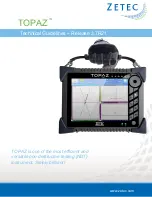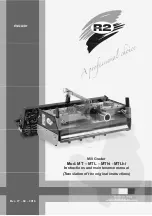
Model 375, 375XL
Reduced Pressure Principle (3/4"-1")
CAUTION: Installation of Backflow Pre
-
venters must be performed by qualified,
licensed personnel. The installer should
be sure the proper device has been
selected for the particular installation.
Faulty installation could result in an
improperly functioning device.
WILKINS Model 375 Reduced Pressure
Principle Backflow Preventers are for use
on potable water lines where a health
hazard could exist if a backflow situation
were to occur.
Proper performance is dependent upon
following these installation instructions
and prevailing governmental and industry
standards and codes. Failure to do so,
according to WILKINS Limited Warranty
"...releases WILKINS of any liability that it
might otherwise have with respect to that
device." Such failure could also result in
an improperly functioning device.
Damage to the device could result wherever
water hammer and/or water thermal expan
-
sion could create excessive line pressure.
Where this could occur, shock arresters
and/or pressure relief valves should be
installed downstream of the device.
1. Before installing a Model 375 Backflow
Preventer, flush the line thoroughly to remove
all debris, chips and other foreign matter. If re
-
quired, a strainer should be placed upstream
of the Backflow Preventer.
CAUTION:
Do not use a strainer in sel
-
dom used emergency waterlines such
as fire lines.
2. Provide adequate space around the
installed unit so that the test cocks will be
accessible for testing and servicing.
3.
WARNING:
If installation of a Model
375 is in a building, a suitable drain ar
-
rangement
MUST
be provided to drain
off spillage from the relief valve. An air
gap at least two times the pipe diameter
must be provided between the relief valve
and the drain piping to prevent a cross-
connection. Air Gap AG-11 not intended
to support weight of drain pipe.
CAUTION:
Do not pipe the relief valve
solidly to a floor drain, sewer or sump.
CAUTION:
An adequately sized drain is
required to prevent possible water dam
-
age due to relief valve discharge.
375 REDUCED PRESSURE PRINCIPLE
1. Start with both shut-off valves closed.
Slowly open the inlet shut-off valve until the
backflow preventer is completely pressur
-
ized. A brief discharge from the relief valve
may occur while the device is pressurizing.
The discharge should cease by the time the
shut-off valve is fully open. Device should
function properly. If the discharge does not
stop, refer to "MAINTENANCE INSTRUC
-
TIONS" for repair procedures.
2. After the device has been pressurized,
vent all trapped air from both check valves
by slightly opening each of the four test
cocks.
3. Slowly open the downstream shut-off
valve. The Model 375 Reduced Pressure
Principle Backflow Preventer is now in
service.
4. If "spitting" or intermittent discharges
from the relief valve are noted, it could
be a result of pressure fluctuation and/or
a water hammer condition in the system.
If such conditions exist, install a WILKINS
water pressure reducing valve, a WILKINS
Model 40XL check valve, or a WILKINS
Model 1250 water hammer shock arrest
-
ers in compliance with industry standards
as needed.
5. After the Model 375 has been prop
-
erly installed, test the device (see "TEST
PROCEDURES"). If the device fails the
test, remove the first and second check
valves and thoroughly flush the device. If
the relief valve fails to operate properly,
inspect the sensing passage for clogging
(see "MAINTENANCE INSTRUCTIONS").
Clean rubber seals of all debris and place
unit back in service.
4. Install valve at least 12 inches above
surrounding flood level.
5. Always consult local codes for installa
-
tion methods, approvals and guidance.
OUTDOOR INSTALLATION
Model 375 Backflow Preventers may be
installed outdoors only if the device is
protected against freezing conditions.
Exposure to freezing conditions will result
in improper function or damage to the
device. The installation location must be
kept above 32°F. All the basic installation
instructions apply.
If installation is in a pit or vault, the Back
-
flow Preventer must never be submerged
in water because this will cause a cross-
connection. Make sure that the pit or vault
always remains dry by providing ample
drainage.
INDOOR INSTALLATION
Indoor installation is preferred in areas
that are subject to freezing conditions. All
the basic installation instructions apply to
such installations.
PARALLEL INSTALLATION
Where uninterrupted service from a single
meter connection must be maintained, two
or more Backflow Preventers may be con
-
nected in parallel. All the basic installation
instructions apply to parallel installation.
Be sure to allow adequate room between
the units for testing and repair.
PLACING THE DEVICE IN SERVICE
After the installation of a Model 375 has
been completed, place the unit in service
as follows:
a company
®
Proposition 65 Warning This product contains chemicals known to the State of California
to cause cancer or birth defects or other reproductive harm.
1
a
®
company
Installation
Testing
Maintenance Instructions
FLOO
R
DRAI
N
I
NLET SHUT OFF
DIRECTION OF FLOW
12" MIN
.
30” MAX.
AIR GA
P
OPTIONAL
WATE
R
METER
175 PSIG 180ß F
3/4" 375 RP
ZURN
WILKINS
2” PIPE
(DRAIN LINE CA
N
BE AN
Y ST
ANDARD
PIPING MATERIAL)
PROTECTIVE
ENCLOSURE






















